- Home
- Alex Berenson
The Shadow Patrol
The Shadow Patrol Read online
ALSO BY ALEX BERENSON
The Secret Soldier
The Midnight House
The Silent Man
The Ghost War
The Faithful Spy
The Number (nonfiction)
THE
SHADOW
PATROL
ALEX BERENSON
G. P. PUTNAM’S SONS New York
G. P. PUTNAM’S SONS
Publishers Since 1838
Published by the Penguin Group
Penguin Group (USA) Inc., 375 Hudson Street, New York, New York 10014, USA • Penguin Group (Canada), 90 Eglinton Avenue East, Suite 700, Toronto, Ontario M4P 2Y3, Canada (a division of Pearson Penguin Canada Inc.) • Penguin Books Ltd, 80 Strand, London WC2R 0RL, England • Penguin Ireland, 25 St Stephen’s Green, Dublin 2, Ireland (a division of Penguin Books Ltd) • Penguin Group (Australia), 250 Camberwell Road, Camberwell, Victoria 3124, Australia (a division of Pearson Australia Group Pty Ltd) • Penguin Books India Pvt Ltd, 11 Community Centre, Panchsheel Park, New Delhi–110 017, India • Penguin Group (NZ), 67 Apollo Drive, Rosedale, North Shore 0632, New Zealand (a division of Pearson New Zealand Ltd) • Penguin Books (South Africa) (Pty) Ltd, 24 Sturdee Avenue, Rosebank, Johannesburg 2196, South Africa
Penguin Books Ltd, Registered Offices: 80 Strand, London WC2R 0RL, England
Copyright © 2012 by Alex Berenson
All rights reserved. No part of this book may be reproduced, scanned, or distributed in any printed or electronic form without permission. Please do not participate in or encourage piracy of copyrighted materials in violation of the author’s rights. Purchase only authorized editions.
Published simultaneously in Canada
Library of Congress Cataloging-in-Publication Data
Berenson, Alex.
The shadow patrol / Alex Berenson.
p. cm.
ISBN 978-1-101-56038-9
1. Intelligence officers—Fiction. I. Title.
PS3602.E75146S53 2012b 2011047146
813'.6—dc23
BOOK DESIGN BY NICOLE LAROCHE
This is a work of fiction. Names, characters, places, and incidents either are the product of the author’s imagination or are used fictitiously, and any resemblance to actual persons, living or dead, businesses, companies, events, or locales is entirely coincidental.
While the author has made every effort to provide accurate telephone numbers and Internet addresses at the time of publication, neither the publisher nor the author assumes any responsibility for errors, or for changes that occur after publication. Further, the publisher does not have any control over and does not assume any responsibility for author or third-party websites or their content.
Contents
PROLOGUE
PART ONE
1
2
3
4
5
6
7
8
9
10
11
PART TWO
12
13
14
15
16
17
18
19
20
21
22
23
PART THREE
24
25
26
27
28
29
30
EPILOGUE
ACKNOWLEDGMENTS
To all the men and women still fighting
Disappointment must be dealt with. You must wander in paradise just once more before you decide not to take the stuff again. A trifle more.
—A Coffin for Dimitrios, Eric Ambler
Certainly there is no hunting like the hunting of man and those who have hunted armed men long enough and liked it, never really care for anything else thereafter.
—“On the Blue Water: A Gulf Stream Letter,” Ernest Hemingway, Esquire, April 1936
PROLOGUE
AMMAN, JORDAN
JUNE 2009
M
arburg.
The trigger for everything.
What really happened.
The cab, a battered blue Nissan, pulled over a hundred meters from the front gate of the headquarters of Jordan’s General Intelligence Directorate—the mukhabarat. The passenger handed over twenty Jordanian dinars and stepped out without waiting for change. He brushed imaginary dust from his tailored blue suit as the Nissan pulled away. The cars and trucks speeding by didn’t bother him. He was a light-skinned Arab, dapper and slim. He wore a thick gold bracelet on his right wrist, a steel Rolex on his left.
The gate guards were more puzzled than alarmed at his approach. His suit fit too well to hide a suicide vest. He didn’t look dangerous. But most Jordanians were wise enough to give the muk a wide berth. Especially ones dressed like him. Before he reached the gatehouse, two guards emerged, AKs at the ready. They put him on his knees and pulled a hood over his head and dragged him inside to explain himself.
His name was Dr. Ahmad Rashid. He was a cardiologist at a hospital in eastern Amman. And—as he told the muk and then the CIA—he wanted to go to Pakistan’s North-West Frontier, infiltrate al-Qaeda, and destroy it. He blamed al-Qaeda for the death of his brother, Farhad, who had killed himself a year earlier in a suicide bombing in Baghdad.
“This very day, one year ago. Twenty-two years old, but he could hardly read or write. If he went a few streets from our house, he was lost. A child. They filled his head with angels and virgins.”
Rashid’s potential was obvious. For nearly a decade, the CIA had sought reliable sources inside al-Qaeda, men who might narrow the search for Osama bin Laden and his deputy, Ayman al-Zawahiri. Eventually, of course, the agency and NSA would track bin Laden to a compound less than fifty miles from the Pakistani capital of Islamabad. SEAL Team Six would do the rest. But in 2009, bin Laden was still a ghost. The agency had no hard information on him. Rashid could fill the gap.
Assuming he was genuine, of course. Brad Stanley, the station chief at Amman, feared that Rashid might be a con man, or—worse—a double agent sent by al-Qaeda. But his story held up under scrutiny from Amman station and the muk. The Jordanians reported that Rashid belonged to a moderate mosque and wasn’t on their watch lists. Amman school records showed that his brother had dropped out in sixth grade. Army files confirmed a suicide bombing in Baghdad by a Jordanian, first name Farhad, last name unknown, on June 16, 2008.
With those preliminaries out of the way, Stanley decided that Rashid was worthy of surveillance. He put a four-man team on Rashid, led by Todd Laitz, his best watcher, maybe the best in the Middle East. For two weeks, Laitz and his men tracked Rashid. He jogged every morning at a gym in downtown Amman. He stayed late at the hospital most nights. He visited his mosque only for the Friday midday prayer, which was more or less obligatory. Laitz summed him up to Stanley in four politically incorrect words: “Even whiter than you.”
“Doubtful.” Stanley had played lacrosse at the University of Maryland, which made him practically albino. “What do you think?”
“I think there’s plenty of upside and we can limit the downside. I’d do it.”
Stanley agreed. So did the bosses in the Counterterrorist Center back at Langley. On July 16, the DO—as everyone still called the unit now officially known as the National Clandestine Service—approved Rashid’s recruitment. The CIA gave him the code name Marburg, after an African virus that caused its victims to bleed to death. The agency hoped that Rashid would do the same to al-Qaeda.
Running Rashid from Amman didn’t make sense. He was handed off to Marci Holm, a senior case officer in Kabul. Making Rashid report to a female operative offered another test for him.
The agency believed that a genuine jihadi wouldn’t want to take orders from a woman. Plus Holm was a rising star, a tall, angular woman who had managed a half dozen successful ops in Afghanistan.
Rashid didn’t complain when he was told Holm would be his controller. Their first meeting came in late August, in Dubai. They walked the giant Mall of the Emirates as Holm gave Rashid a three-hour crash course on tradecraft. No dead drops or chalk marks, just e-mail addresses and keywords. Cricket to schedule a meeting, pulse if he believed he’d been discovered.
“You shouldn’t have trouble getting in and out,” she said. They were speaking English. Holm’s Arabic was good. Rashid’s English was better. “They won’t want to keep you in the mountains. They don’t have many men who can travel as freely as you.”
“Maybe they’ll want me to take care of them.”
“Even then they’ll let you leave to get the drugs you need to treat them. As long as they trust you, it won’t be a problem. And your brother martyred himself for them.”
“Animals.”
“They’re not stupid. You need to be cautious. No unnecessary risks. I don’t have to tell you what happens if they question your loyalty.”
“I understand.”
“But yes, we think they’ll accept you. We think it’s possible that within a few months you could meet their top men.”
“Bin Laden.” Rashid whispered the name.
“As far as we can tell, only a few people ever see him. Al-Zawahiri’s more likely. You understand, he sets the strategy. He’s the one who decides to use boys like Farhad as martyrs.”
“I know you don’t trust me,” Rashid said, apropos of nothing.
“If I didn’t trust you, I wouldn’t be here.”
“It’s all right. I’ll prove myself to you.”
They’d walked the mall twice, end to end, Rashid’s loafers clacking on the polished floors. Along the way they’d stopped at a Polo store, where he tried on a salmon-colored long-sleeved shirt. “Do you like it?”
“It’s very nice.” He’s not a terrorist, Holm thought. Can’t be. Terrorists don’t wear pink Polo shirts.
Now they had looped back to the mall’s signature attraction, its indoor ski hill, an almost criminal waste of energy, considering that the temperature outside was 101 degrees. But Dubai—like Las Vegas, its American twin—pretended to exist outside the laws of nature. Dubai created wants, and then satisfied them at a tidy profit. Put skiing in the desert, and people who’d never seen snow would buy twelve-hundred-dollar Prada jackets to skid down a two-hundred-foot hill. Yet Holm had to admit she enjoyed visiting the place, its glass-and-steel towers so unlike Kabul’s shattered blocks. She’d take endless consumerism over endless war.
Rashid watched the skiers. “Shall we try it?” As if they were on a date. His manners matched his clothes. He was old-fashioned, almost courtly.
“Not me.” She’d grown up in Oregon, snowboarding at Mount Hood. She wasn’t renting a parka for this foolishness. “But you should. Have you ever skied before?”
“No. But I shouldn’t make you wait—”
“Go. I’ll watch.” A bar overlooked the hill. Inevitably, it was styled as an après-ski lodge and called the St. Moritz Café. Holm sat by the natural-gas fireplace and sipped hot cocoa and watched Rashid ski. He moved cautiously, like most first-time adult skiers. But she saw that with a little training, he’d learn fast. He never let the skis run away from him. He saw her watching, waved. She waved back, and as she did—
Realized—
He’s too smooth. Has been all along. If he can pick this up this quick, then he can fool you a dozen different ways. Get rid of him. Burn him. Now.
SHE KEPT WAVING. The feeling faded as fast as a sunset. She had no reason to distrust this man. She felt as though she’d embarrassed herself, flinched in public. Though she hadn’t said a word aloud.
An hour later, he appeared, his hair mussed, grinning.
“Fun?”
“In point of fact, I enjoyed it enormously.”
“That means yes, right?”
“You missed out, Miss Simmons.” Her cover name.
“Next time.”
They walked to the mall’s giant parking garage and found the Toyota minivan she’d rented. There they went through the usual end-of-meeting housekeeping. She pushed five thousand dollars on him over his objections and gave him a Motorola that looked like a stock smartphone but was satellite-capable. “You get in trouble, you send the distress signal, we’ll come get you. Anywhere in the world.”
“Thank you, Miss Simmons. But I don’t intend to get in trouble.”
“Nobody ever does.”
“Until I see you next, be well.”
“You, too.”
He walked away without looking back.
BACK IN KABUL, she decided to tell Manny Cota, station chief, about her premonition. “Maybe we should slow it down with Marburg. Check him again.”
“What now?”
She explained. Cota was less than supportive. Much less. “I’m hearing this right, you want to lose this guy because you didn’t like the way he skied. Because he skied too well?”
“I’m telling you I’ve never had a feeling like this before.”
“And that’s good. I never pegged you as paranoid, Marci. You think those boys found this guy in Amman, convinced him to infiltrate us. And don’t forget the Jordies are on board, they think he’s a hundred percent copacetic.”
“I’m just saying—”
“And I’m saying we’re going to see what he gives us. You don’t want to be involved, okay. But this is happening. And if it happens without you, it won’t be good for you. Or Pete either.”
Pete was Peter S. Lautner, her husband, another case officer. They’d met five years before in Kabul, been together ever since. Like her, he was a rising star, just promoted to become the agency’s top liaison with the Afghan muk.
“You can’t put this on Pete.”
“It is what it is. Your career, his career, all tied up.”
Giving her something else to worry about. “Can I tell you something? You are a grade-A prick.” She tried to make her tone lighter than the words. She failed.
“Sticks and stones, Marci. I take it I have your cooperation.”
“As always.”
SHE TALKED the situation over with her husband that night, as they ate at the rough-hewn wooden table in their kitchen. Junior CIA officers lived in the Ariana Hotel. Even with wifi and a twenty-four-hour cafeteria, the hotel was depressing, its rooms low and dark, shadowed by tinted blastproof windows. More senior officers were assigned to homes in the walled zone around the hotel. Holm and Lautner had a two-bedroom brick house a block from the Ariana. Holm thought she might even miss it when they left.
She swirled a glass of the red wine she’d bought the day before in the Dubai airport, a thousand light-years away. “What do you think?”
He hesitated. “The guy’s been vetted pretty close.”
“You think I overreacted.”
“I wasn’t there, Marci.”
“I love you, husband, but that’s the wrong answer.”
But she knew she was beaten. The next morning, she filed her report on Rashid to Langley, hinting at her concerns in passive language only a bureaucrat could love. Marburg appears trustworthy, but it is important to note that his reliability has not been tested. Until he provides actionable intelligence, reasonable precautions as to his handling are dictated.
IN SEPTEMBER, Rashid arrived in Peshawar, the Pakistani city that had been a jihadi hub for thirty years. As the CIA had expected, he connected easily with al-Qaeda. His medical degree made him useful. His brother’s death made him trustworthy. A few days before Halloween, he reported that three midlevel Talib commanders would meet in a village northwest of Peshawar. The agency confirmed the report with another source, and a Predator drone sent the Talibs into the next world with a Hellfire missile.
In mid-November, Rashid inform
ed Holm that he’d seen a weapons cache hidden in a village near the Afghan border. Satellite overheads showed two pallets of artillery shells and a case of AKs. The CIA’s lawyers refused to allow a missile strike because of the risk of civilian casualties if the shells blew. Even so, the agency counted the tip as Rashid’s second success.
A few days later, he reported meeting two German Turks at a safe house in Peshawar. The men had come to receive training for an attack in Berlin. They hadn’t given up specifics, but Rashid had learned their names. The agency confirmed with its German counterpart, the BND, that the men were members of a Hamburg mosque known for its radicalism. They had left Germany three weeks before. CIA and BND agreed that they would merit a very close look when they returned. Rashid’s stock rose further.
Then he sent an urgent message requesting a face-to-face with Holm. They agreed to meet in the giant Pakistani port city of Karachi. The agency had two safe houses there, but the Pakistani Inter-Services Intelligence agency knew of both, so Holm preferred not to use them. Instead she picked a two-star hotel at random. Two-star hotels worked best for these meetings. They were crummy enough that the clerks didn’t ask questions, not so terrible that someone like her would attract attention.
She arrived at four p.m., two hours early. Two security officers and a tech operative were posted across the hall. The hotel was shabbier than she’d expected, linoleum floors and peeling yellow paint. It smelled of curry from the restaurant next door. Holm’s room, 308, was a ten-by-eight cell with a sagging twin bed and a broken television.
Holm locked the door, closed the curtains, and waved her handheld RF detector over the walls. Finding no bugs, she tucked the detector away and pulled a black lipstick tube from her cosmetics case. The tube was actually a fish-eye camera and microphone, with a transmitter that fed a recorder in the room across the hall. The images weren’t great, but the sound quality was excellent. She looked for a place to hide the camera, but couldn’t find one. Instead, she left it out on the nightstand. Men never noticed cosmetics. “Testing, one, two, three,” she said.

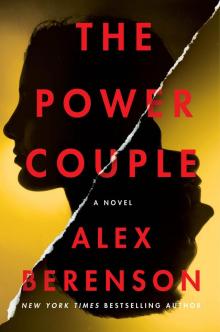 The Power Couple
The Power Couple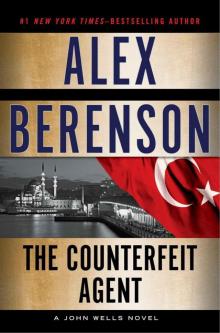 The Counterfeit Agent
The Counterfeit Agent The Midnight House
The Midnight House The Prisoner
The Prisoner The Ghost War
The Ghost War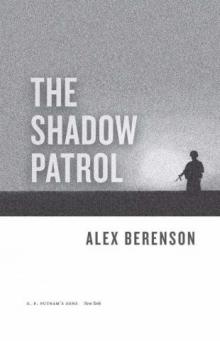 The Shadow Patrol jw-6
The Shadow Patrol jw-6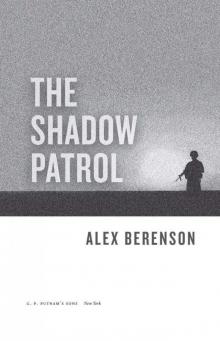 The Shadow Patrol
The Shadow Patrol The Deceivers
The Deceivers The Night Ranger jw-7
The Night Ranger jw-7 The Faithful Spy
The Faithful Spy The Prince of Beers (Kindle Single)
The Prince of Beers (Kindle Single) The Silent Man jw-3
The Silent Man jw-3 The Silent Man
The Silent Man The Wolves
The Wolves The Midnight House jw-4
The Midnight House jw-4 The Ghost Agent
The Ghost Agent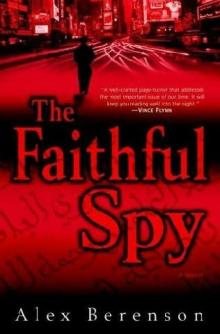 The Faithful Spy jw-1
The Faithful Spy jw-1 The Prince of Beers
The Prince of Beers Twelve Days
Twelve Days The Secret Soldier jw-5
The Secret Soldier jw-5 The Ghost War jw-2
The Ghost War jw-2 The Night Ranger
The Night Ranger